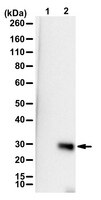ABS2206-100UG Sigma-AldrichAnti-phospho-Ubiquitin (Ser57)
Anti-phospho-Ubiquitin (Ser57), Cat. No. ABS2206, is a rabbit polyclonal antibody that detects phospho-Ubiquitin (Ser57) and is tested for use in Affinity Binding Assay and Western Blotting.
More>> Anti-phospho-Ubiquitin (Ser57), Cat. No. ABS2206, is a rabbit polyclonal antibody that detects phospho-Ubiquitin (Ser57) and is tested for use in Affinity Binding Assay and Western Blotting. Less<<Prodotti consigliati
Panoramica
| Replacement Information |
|---|
| References |
|---|
| Product Information | |
|---|---|
| Format | Purified |
| Presentation | Purified rabbit polyclonal antibody in buffer containing 0.1 M Tris-Glycine (pH 7.4), 150 mM NaCl with 0.05% sodium azide. |
| Quality Level | MQ200 |
| Physicochemical Information |
|---|
| Dimensions |
|---|
| Materials Information |
|---|
| Toxicological Information |
|---|
| Safety Information according to GHS |
|---|
| Safety Information |
|---|
| Storage and Shipping Information | |
|---|---|
| Storage Conditions | Recommend storage at +2°C to +8°C. For long term storage antibodies can be kept at -20°C. Avoid repeated freeze-thaws. |
| Packaging Information | |
|---|---|
| Material Size | 100 μg |
| Transport Information |
|---|
| Supplemental Information |
|---|
| Specifications |
|---|
| Global Trade Item Number | |
|---|---|
| Numero di catalogo | GTIN |
| ABS2206-100UG | 04065267327716 |
Documentation
Anti-phospho-Ubiquitin (Ser57) MSDS
| Titolo |
|---|
Anti-phospho-Ubiquitin (Ser57) Certificati d'Analisi
| Titolo | Numero di lotto |
|---|---|
| Anti-phospho-Ubiquitin (Ser57) - Q3773076 | Q3773076 |








